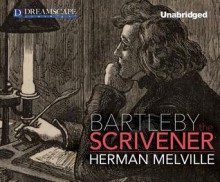
Bartleby, the Scrivener
Herman Melville was an 18th century American novelist, poet, essayist and short story writer. He is best known for his works Moby Dick and Typee. During his lifetime he was considered a failure, but after his death his worth as a writer was recognized. Bartleby is a novella, which first appeared...
show more
Herman Melville was an 18th century American novelist, poet, essayist and short story writer. He is best known for his works Moby Dick and Typee. During his lifetime he was considered a failure, but after his death his worth as a writer was recognized. Bartleby is a novella, which first appeared in Putnam's Magazine. The narrator is an elderly lawyer who helps his clients with mortgages, titles and bonds. The lawyer's office has two employees Nippers and Turkey. Turkey is a drunk and Nippers has indigestion. The office is able to function because Nippers indigestion is at a time when Turkey is sober and Turkey is hung over when Nippers is feeling better. Bartleby is hired in the hopes that his temperament will calm down the office. As the story progresses Melville brings a sense of the human condition as seen through the eyes of a lowly employee.
show less
Format: audiobook
ISBN:
9781624069376 (1624069371)
Publish date: October 15th 2013
Publisher: Dreamscape Media
Edition language: English
Category:
Classics,
Academic,
School,
Literature,
Read For School,
American,
Classic Literature,
Literary Fiction,
19th Century,
Short Stories,
Fiction

I read "Bartleby the Scrivener" as I was told it was a good introduction to Herman Melville because it was short, accessible and showed how ahead of his time Melville was. All of those things turned out to be true but especially the last. "Bartleby The Scrivener" was published in 1853, the same ...

No one told me it was a comedy, or I might have read it sooner. It was very easy to imagine the story illustrated by Edward Gorey.Actually, Veronica told me that Melville wrote this as his response to everyone asking him to write a sequel to Moby Dick. Going into it with the idea of Cartman saying "...

“I would prefer not to.” I’ve seen this phrase all over the bookish internet: on totes, mugs, t-shirts. Bartleby’s refrain always struck me as petulant. It reminds me of a kid whose parents have just asked them to do their chores. I would prefer not to do the dishes. The response to this usually som...

I feel guilty not giving this a five. I recently used Bartleby as a write-in candidate in a poll for U.S. president, based strictly on his reputation of saying "I prefer not to..." I prefer not to tell you one spurious claim about Bartleby's "problem", this time on Wikipedia, since the theory mixes ...

Loved this one. I was surprised by how funny Melville could be, which Moby Dick's slight touches of the ironic (church sermon, etc.) wouldn't really suggest. I would like to re-read this with more focus on the narrator: why does he allow Bartleby to stick around so long? Does his reluctance betray a...






 9 years ago
9 years ago